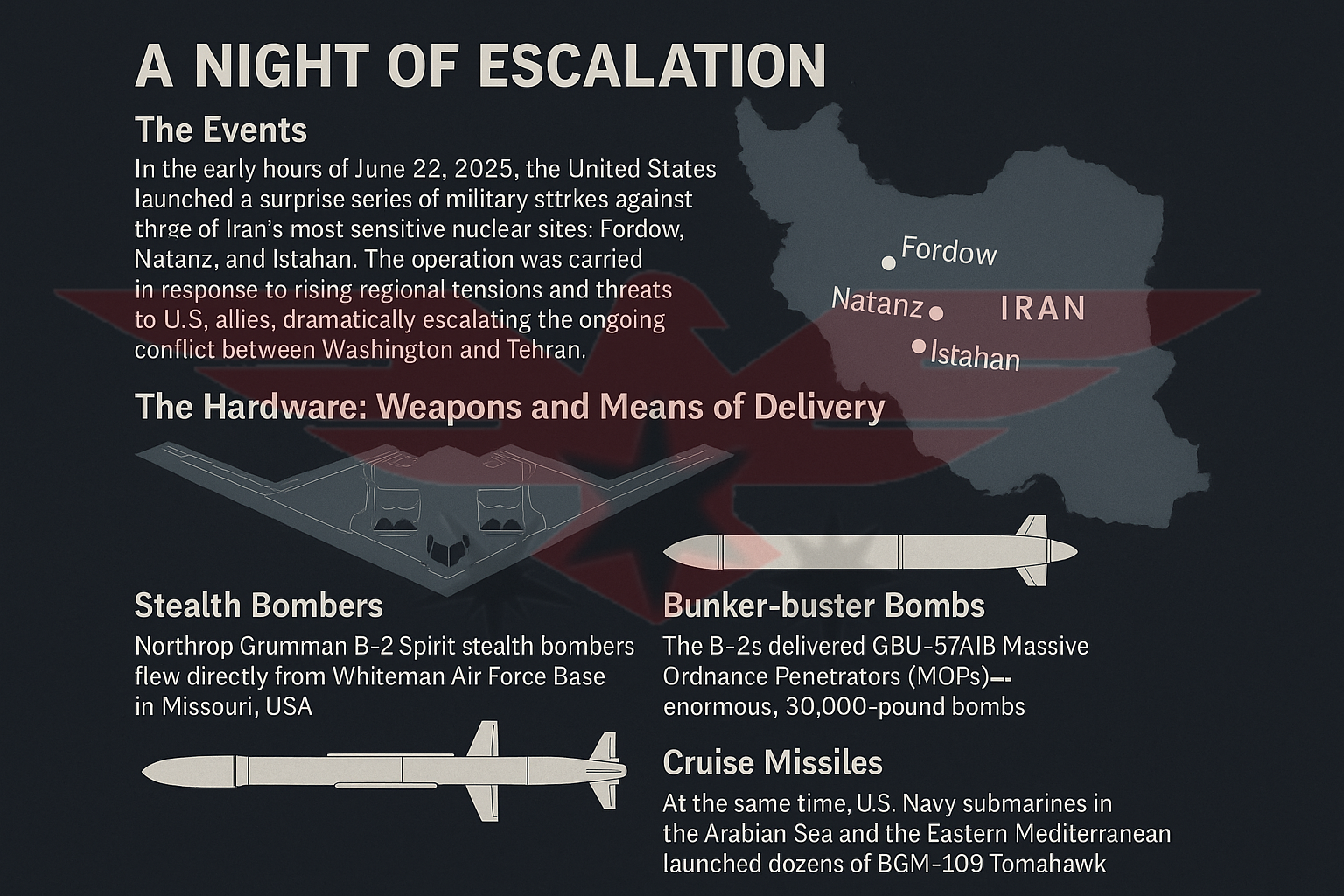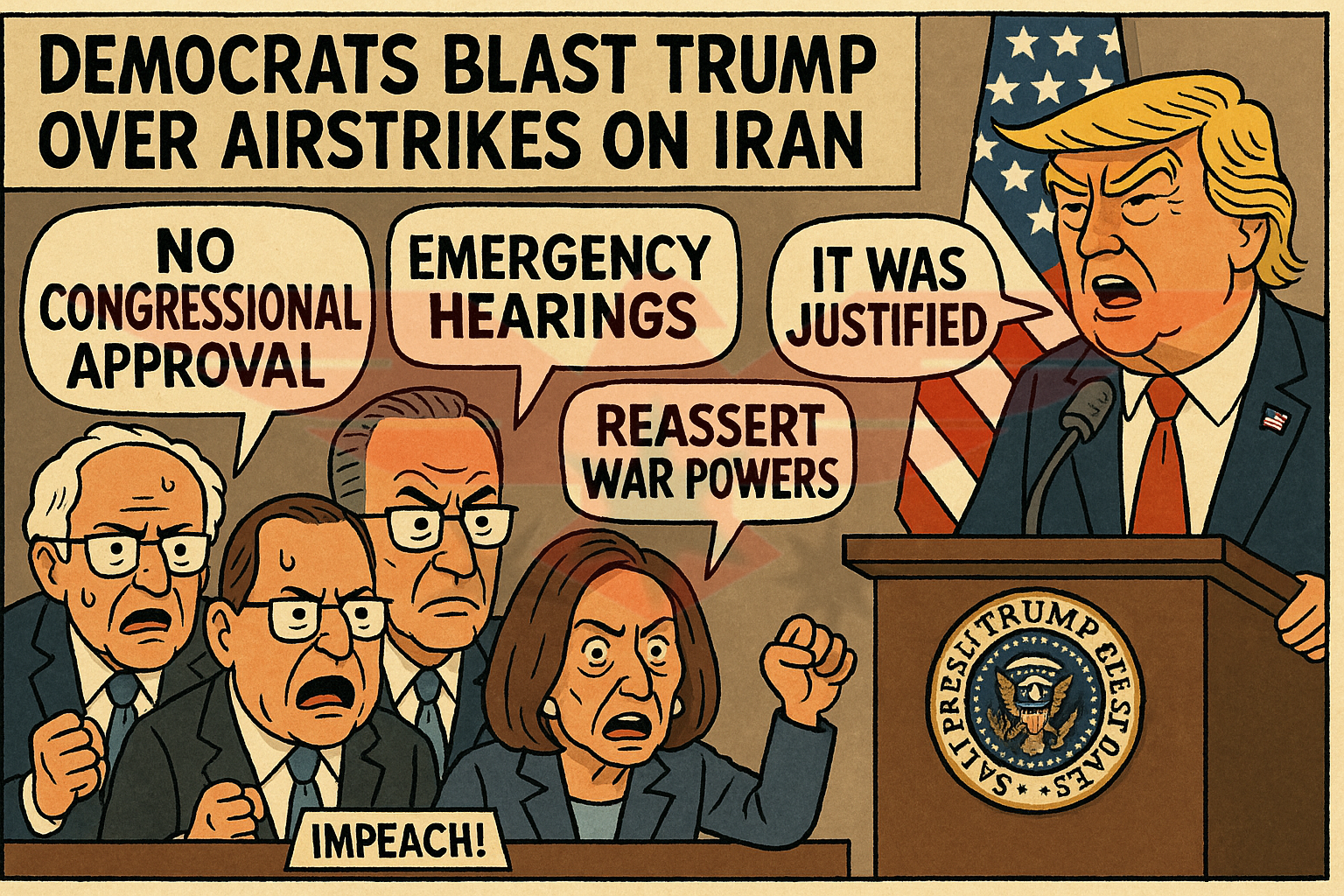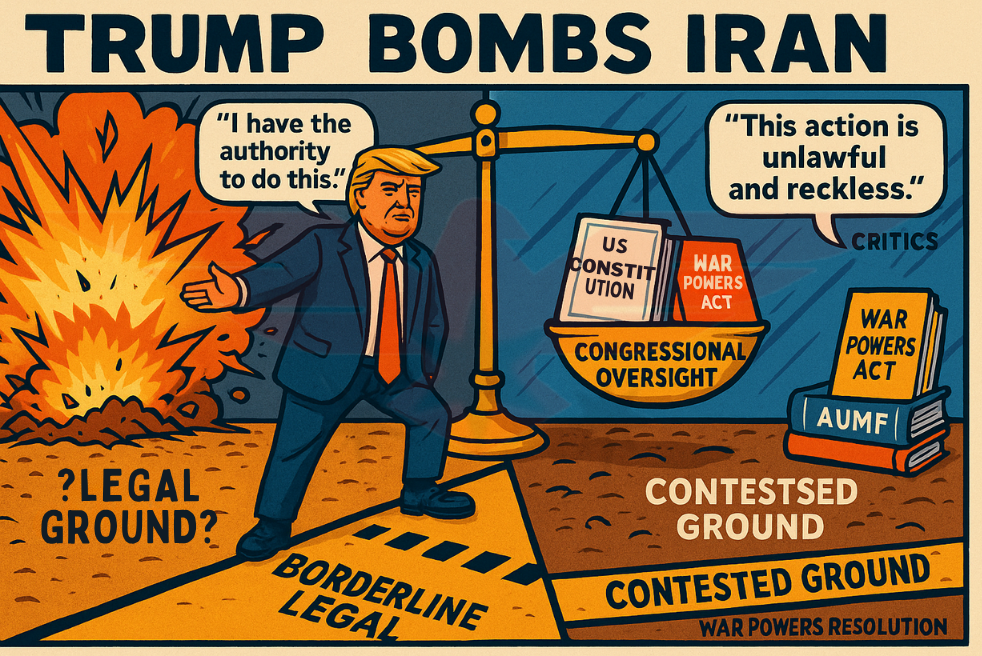Presidential Power, Congressional Pushback, and the Blurred Lines of Modern War

A Night of Escalation
In the early hours of June 22, 2025, the United States launched a surprise series of military strikes against three of Iran’s most sensitive nuclear sites: Fordow, Natanz, and Isfahan. The operation was carried out in response to rising regional tensions and threats to U.S. allies, dramatically escalating the ongoing conflict between Washington and Tehran.
The Hardware: Weapons and Means of Delivery
The strikes were notable for the advanced military technology and their precise means of deployment:
Stealth Bombers:
Northrop Grumman B-2 Spirit stealth bombers flew directly from Whiteman Air Force Base in Missouri, USA, flying intercontinental round-trip missions to Iran. This demonstrated U.S. capability to project power globally while remaining virtually undetected by radar.Bunker-Buster Bombs:
The B-2s delivered GBU-57A/B Massive Ordnance Penetrators (MOPs)—enormous, 30,000-pound bombs built to destroy deeply buried and fortified nuclear facilities like those at Fordow and Natanz.Cruise Missiles:
At the same time, U.S. Navy submarines in the Arabian Sea and the Eastern Mediterranean launched dozens of BGM-109 Tomahawk cruise missiles. The submarines believed to be involved include Ohio-class guided-missile submarines (SSGN) and possibly Virginia-class attack submarines. These platforms can strike from international waters, ensuring operational secrecy and safety of crews.
This combination of air and sea-based assets maximized the element of surprise and allowed the U.S. to hit multiple fortified targets almost simultaneously.

The Reaction: Democrats and Conservatives
Republican leaders and MAGA-aligned influencers quickly rallied behind President Trump, praising the strikes as necessary to defend U.S. interests and protect allies. They emphasized the need for swift action in the face of Iranian aggression.
Democrats and some moderate Republicans questioned both the legality and the wisdom of the strikes. Concerns focused on the lack of Congressional approval and the risk of triggering a broader war in the Middle East. Many called for immediate hearings and a reassertion of Congressional war powers.
The response from the Democratic leadership was especially sharp. Several prominent Democrats accused the President of bypassing the Constitution and putting American and allied lives at risk without proper oversight. A vocal group of House Democrats went further, openly calling for an impeachment inquiry on the grounds of executive overreach and unlawful use of military force. They argued that the President had ignored the War Powers Resolution and failed to consult Congress, demanding accountability through formal proceedings. This push for impeachment, while controversial and unlikely to succeed given Republican control, signaled the depth of concern and anger among opposition lawmakers. Concerns focused on the lack of Congressional approval and the risk of triggering a broader war in the Middle East. Many called for immediate hearings and a reassertion of Congressional war powers.

Is This a Declaration of War?
The question of whether the U.S. strikes on Iran constitute a declaration of war is central to international and domestic debate. Despite the scale and sophistication of the June 22, 2025 attacks, neither the United States nor Iran has formally declared war. Instead, both countries have used charged rhetoric—“outrageous,” “illegal,” “criminal”—while stopping short of official declarations. This approach reflects a modern trend: since World War II, wars are rarely declared in formal terms, even when military actions are intense and ongoing.
By avoiding the formal language of war, both sides retain flexibility. For Iran, refraining from a declaration may help avoid immediate, wide-scale escalation or obligations under international treaties. For the U.S., calling the strikes a “defensive operation” frames the action as justified under international law and reduces the need for Congressional approval or public debate.
Nonetheless, the absence of formal declarations does not lessen the reality on the ground: coordinated attacks, threats of retaliation, and heightened military readiness have all the features of de facto warfare. In the eyes of many observers, the conflict has already crossed into a state of war—regardless of official language—underscoring the blurred lines of modern international conflict.
An Emergency to Protect a Key Ally?
President Trump justified the operation as a necessary emergency response to protect Israel, America’s key ally in the region. The administration argued that credible intelligence pointed to imminent threats against Israeli and U.S. interests, requiring decisive and immediate military action.
Supporters of the strikes have argued that the threat from Iran was both real and urgent, citing reports of Iranian preparations for attacks on Israeli or U.S. targets in the Middle East. They contend that waiting for Congressional approval could have jeopardized lives and allowed Iran to carry out its plans. The administration further emphasized that the special relationship with Israel includes a longstanding security commitment, obliging the U.S. to act when Israel is under direct threat. Critics, however, have questioned whether the evidence of imminent danger was truly compelling, and whether there were alternative diplomatic or military options short of a massive strike. Nonetheless, the decision reflects a doctrine of preemptive defense and signals to both allies and adversaries that the U.S. is willing to act swiftly and unilaterally to defend its closest partners.

Were the President’s Actions Legal?
The legality is hotly debated:
The U.S. Constitution divides war powers: Congress has authority to declare war (Article I, Section 8), while the President serves as Commander-in-Chief (Article II). The War Powers Resolution of 1973 requires the President to notify Congress within 48 hours of deploying armed forces, and limits unauthorized military action to 60 days. Laws like the Authorization for Use of Military Force (AUMF) have also given presidents flexibility in the past. While Trump’s actions arguably fit within some emergency powers, critics say he overstepped by not obtaining direct Congressional approval for this specific operation.
The UN Charter permits force only in self-defense or with Security Council approval. The U.S. claims it acted to defend an ally, but Iran and much of the international community consider the strikes a violation of international law.
The action is “borderline legal”—not clearly illegal by recent U.S. standards, but controversial and open to further legal and political challenge
The Legality Debate: Power and Politics
Much of the debate over legality is political as well as legal. With Republicans controlling both the House and Senate, President Trump faces little immediate opposition in Congress. Historically, when a president’s party dominates Congress, there’s less institutional pushback—even when the president operates in a legal gray area. This dynamic allows the executive branch to test or stretch the boundaries of established law, often with few real consequences. Critics argue that robust debate and oversight are essential to prevent the erosion of checks and balances, especially on matters as grave as war. Supporters counter that unity in government enables swift, decisive action during crises.
Conclusion
The U.S. strike on Iran is a powerful example of how law, politics, and military power intersect—and how, in times of crisis, presidents often act first and debate legality later. As long as Trump enjoys support from a Congress controlled by his party, the boundaries of presidential authority in military matters remain as fluid and contested as ever. The consequences of such actions ripple far beyond Washington, influencing international stability, alliances, and the lives of countless civilians across the globe.

